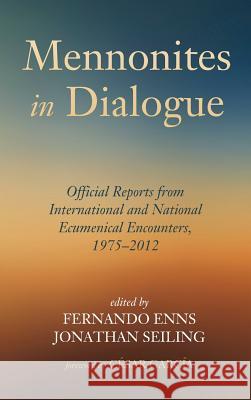Mennonites in Dialogue » książka
Mennonites in Dialogue
ISBN-13: 9781498203654 / Angielski / Twarda / 2015 / 504 str.
Mennonites in Dialogue
ISBN-13: 9781498203654 / Angielski / Twarda / 2015 / 504 str.
(netto: 333,87 VAT: 5%)
Najniższa cena z 30 dni: 348,61
ok. 16-18 dni roboczych.
Darmowa dostawa!
Ecumenical dialogue is not an end in itself. It serves as an indispensable instrument to overcome the divisive, mutual misinterpretations of the past. Ecumenical encounters pave the way toward healing painful memories and lead to a deeper understanding of the churchs given unity, thus becoming a more credible witness of that truth.Mennonites in Dialogue is a collection of all conversation texts involving Mennonites on international and national levels, covering forty years of encounters with Roman Catholics, Lutherans, Reformed, Baptists, and Seventh-Day Adventists, among others. The texts illustrate growth in agreement as well as identify the remaining convictions that still divide. Several texts appear here for the first time in English. An introductory essay provides an overview of the motivations for dialogue, the challenges faced--both in the processes of dialogue and in their substance--as these conversations evolved, the achievements gained, and the prospects for the future. A detailed index enables a more effective comparison of the topics and issues throughout the collection.Mennonites in Dialogue is an indispensable resource for anyone seeking to understand the process of identity formation within the Christian tradition through encounter with the other, as well as a rich introduction to the theology of that global peace church--the Mennonites.""Mennonites in Dialogue is a great invitation to discovery. Discover ones own heritage when others ask us: Who are you? Discover the history of a peace church in relation to others on a shared road: How do we differ, and what connects us? But also discover the questions not fully answered yet: Where do we go from here? May the dialogues continue, for the advancement of our mutual witness of reconciliation through Jesus Christ!""--Rev. Regina Claas, EBM International Consultant for Leadership Training in Southern AfricaFernando Enns is Professor of (Peace-) Theology and Ethics at Vrije Universiteit Amsterdam and Director of the Institute for Peace Church Theology of the University of Hamburg. A member of the World Council of Churches Central Committee since 1998, he is author of The Peace Church and the Ecumenical Community (2007).Jonathan Seiling is a translator and historical theologian engaging interconfessional history. He is currently a research associate at the Institute of Peace Church Theology at the University of Hamburg, Germany and a Fellow of the Toronto Mennonite Theological Centre.











